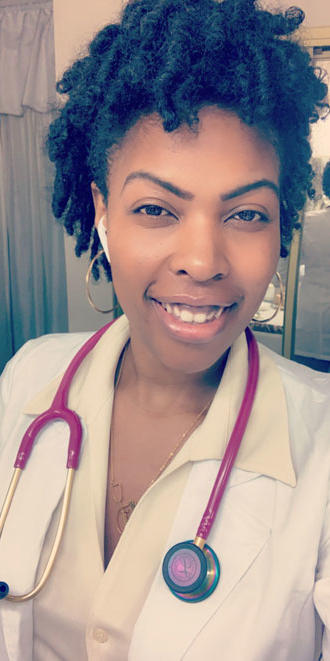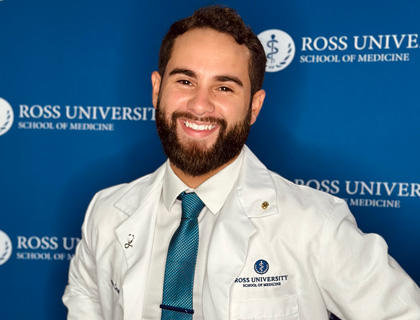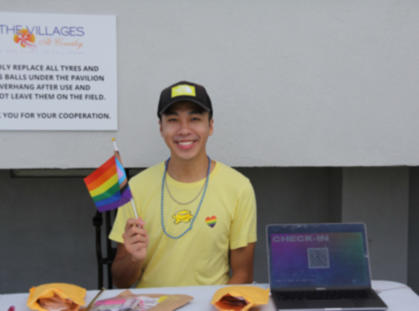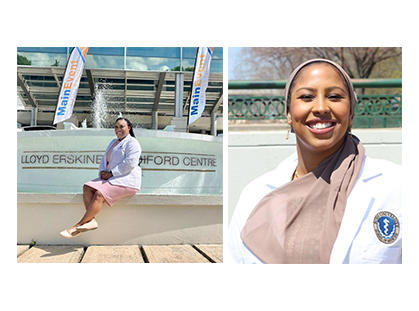Despite setbacks from non-supportive undergrad academic counselors and a grade point average that didn’t accurately reflect her ability, Ross University School of Medicine (RUSM) student Janelle Prothro never lost sight of the end goal. In fact, she used the negativity to set her sights higher.
“You are already putting me in a box and then telling me I can’t do it because I’m Black. It’s a double insult,” said Janelle about how she was treated in high school and college. “You start to feel like you don’t know the path to get into medicine; you just have to remember you can never give up. If I don’t have the gumption or tenacity, that’s one thing. But when I’ve shown that I do, don’t make it harder than it already is.”
In college, Janelle began studying science but was told it would be an impossible feat as a track athlete. “I knew I could mesh my passion for science with my love of people and problem solving to become a physician, but only my family believed in me.” Switching majors coupled with misguided academic counselors led to missed opportunities that included an incomplete Medical College Admission Test (MCAT). By the time Janelle found a promising mentor and was back on track for pre-med, it was too late.
Never Give Up
“I had to complete a post-bacc to boost my GPA, show my dedication, start with a clean slate and study for the MCAT,” Janelle said, referring to a post-baccalaureate program, which she needed to complete her prerequisite med school courses. Through a program at Charles R. Drew University, Janelle earned a master’s degree in biomedical sciences before taking off one year to teach eighth-grade science and work as a Stanford University School of Medicine medical program coordinator.
“I’m grateful for the program that helped me bridge the gap,” she said of her post-baccalaureate experience. Janelle is a scholarship recipient of the RUSM Access and Inclusion in Medicine (AIM) Scholars Program, an initiative that partners with Historically Black Colleges and Universities (HBCUs) including Charles R. Drew University. About 24 percent of RUSM students comprise underrepresented minorities, which includes Black, Hispanic and Native American.
Thankful for her journey thus far, Janelle is ready to become an influential physician in the Black community. “Historically, there are not a lot of instances where Black patients are treated equally,” she said, recalling her grandfather’s fear and distrust of doctors after he was diagnosed with prostate cancer. “You get guarded if you don’t have someone who’s dedicated to your care. Patients are the experts of their medical history so if doctors don’t properly communicate or treat you like a stereotype, patients won’t be as open about what’s going on with them and then they can’t be properly diagnosed.”
Paying it Forward
Janelle is passionate about women’s health and hopes to someday “create a safe place for women of color to bring children into the world.” She’s also inspired to give back, an effort that began as a sorority sister of Alpha Kappa Alpha, which touts an alumnae roster including Vice President Kamala Harris, former First Lady Michelle Obama, singer Alicia Keys and her own mother. “It was founded by a group of women who were one generation removed from slavery and among less than 1,000 who were afforded the opportunity to pursue higher education. They chose to use their privilege to bridge the gap and provide service to their community.”
Growing up in California, Janelle said she rarely experienced blatant racism but recalled not being given the benefit of the doubt, being stereotyped, and receiving underhanded comments and side glances for no apparent reason. She fondly remembers valuable advice from her mom. “She wanted me to be knowledgeable about things that could be used against me but said not to let it defeat me. She said no one is going to hand me anything, that people will look at me differently so I’ll have to be that much more polished, that people will assume things and that I may fall victim to police brutality. But she also said if I’m a good person, people who matter will notice and that my actions will speak louder than my words.”
Make sure to check out our Black History Month Alumni Spotlight seminar.
RUSM Diversity and Inclusion Taskforce
A group of 16 RUSM students, faculty, colleagues and alumni have begun leading a holistic review of diversity, equity and inclusion at the University and will soon deliver a report of short- and long-term recommendations. This is the first of many steps to sustain change at the infrastructure level.
As RUSM prepares to engage, train, educate, advocate and invest in this process to align with the Black community at our University and in all the underrepresented and marginalized communities in which we serve, we invite others to share feedback with us because we know the fight for social justice is a community collaboration.




